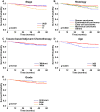Prognostic factors in epithelial ovarian cancer: A population-based study
- PMID: 29579127
- PMCID: PMC5868839
- DOI: 10.1371/journal.pone.0194993
Prognostic factors in epithelial ovarian cancer: A population-based study
Abstract
The overall survival (OS) of patients with ovarian cancer is poor while epithelial ovarian cancer (EOC) is the most lethal gynecologic cancer. The aim of the present study was to evaluate the clinico-pathologic characteristics, especially the prognostic factors, for patients with epithelial ovarian cancer (EOC) in Taiwan. Information about newly diagnosed patients with EOC from 2009 to 2012 was retrieved from the database of the Taiwan Cancer Registry. Data from 2009 to 2013 for the respective cases from the claims database of Taiwan's National Health Insurance and National Death Registry were then retrieved. Potential prognostic factors were analyzed. The mean age at diagnosis of the 2,498 patients was 52.8 years. Serous carcinoma and clear cell carcinoma were diagnosed in 43.3% and 22.8% of the total patients, respectively. For patients with early-stage disease, taxane-based adjuvant chemotherapy, stage I, and younger age at diagnosis led to better overall survival (p = 0.030, p = 0.002, p<0.001, respectively) in multivariable analysis. For advanced-stage patients, histology (endometrioid type), taxane-based adjuvant chemotherapy, stage, and age at diagnosis had a significant impact on OS (p<0.001, p = 0.020, p<0.001, p<0.001, respectively). In conclusion, taxane-based chemotherapy impacts the outcome of patients with EOC. Personalized medicine may be needed for different histological types of EOC because of their different outcomes.
Conflict of interest statement
Figures



References
-
- Ferlay J, Soerjomataram I, Dikshit R, Eser S, Mathers C, Rebelo M, et al. Cancer incidence and mortality worldwide: sources, methods and major patterns in GLOBOCAN 2012. Int J Cancer. 2015; 136: E359–E386. doi: 10.1002/ijc.29210 - DOI - PubMed
-
- Kurosaki A, Hasegawa K, Kato T, Abe K, Hanaoka T, Miyara A, et al. Serum folate receptor alpha as a biomarker for ovarian cancer: implications for diagnosis, prognosis and predicting its local tumor expression. Int J Cancer. 2016; 138: 1994–2002. doi: 10.1002/ijc.29937 - DOI - PubMed
-
- Chiang YC, Chen CA, Chiang CJ, Hsu TH, Lin MC, You SL, et al. Trends in incidence and survival outcome of epithelial ovarian cancer: 30-year national population-based registry in Taiwan. J Gynecol Oncol. 2013; 24: 342–351. doi: 10.3802/jgo.2013.24.4.342 - DOI - PMC - PubMed
-
- Kajiyama H, Shibata K, Mizuno M, Umezu T, Suzuki S, Sekiya R, et al. Survival benefit of taxane plus platinum in recurrent ovarian cancer with non-clear cell, non-mucinous histology. J Gynecol Oncol. 2014; 25: 43–50. doi: 10.3802/jgo.2014.25.1.43 - DOI - PMC - PubMed
-
- Anuradha S, Donovan PJ, Webb PM, Brand AH, Goh J, Friedlander M, et al. Variations in adjuvant chemotherapy and survival in women with epithelial ovarian cancer—A population-based study. Acta Oncol. 2016; 55: 226–233. doi: 10.3109/0284186X.2015.1054950 - DOI - PubMed
Publication types
MeSH terms
Substances
LinkOut - more resources
Full Text Sources
Other Literature Sources
Medical

